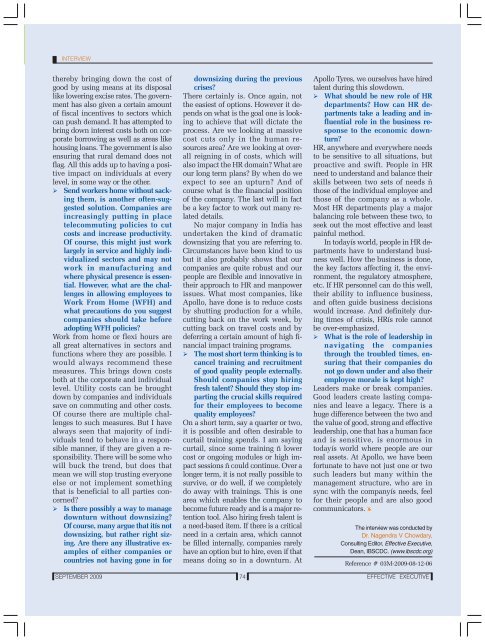Social Cause Marketing - The Regis Group Inc
Social Cause Marketing - The Regis Group Inc
Social Cause Marketing - The Regis Group Inc
You also want an ePaper? Increase the reach of your titles
YUMPU automatically turns print PDFs into web optimized ePapers that Google loves.
INTERVIEW<br />
thereby bringing down the cost of<br />
good by using means at its disposal<br />
like lowering excise rates. <strong>The</strong> government<br />
has also given a certain amount<br />
of fiscal incentives to sectors which<br />
can push demand. It has attempted to<br />
bring down interest costs both on corporate<br />
borrowing as well as areas like<br />
housing loans. <strong>The</strong> government is also<br />
ensuring that rural demand does not<br />
flag. All this adds up to having a positive<br />
impact on individuals at every<br />
level, in some way or the other.<br />
Send workers home without sacking<br />
them, is another often-suggested<br />
solution. Companies are<br />
increasingly putting in place<br />
telecommuting policies to cut<br />
costs and increase productivity.<br />
Of course, this might just work<br />
largely in service and highly individualized<br />
sectors and may not<br />
work in manufacturing and<br />
where physical presence is essential.<br />
However, what are the challenges<br />
in allowing employees to<br />
Work From Home (WFH) and<br />
what precautions do you suggest<br />
companies should take before<br />
adopting WFH policies?<br />
Work from home or flexi hours are<br />
all great alternatives in sectors and<br />
functions where they are possible. I<br />
would always recommend these<br />
measures. This brings down costs<br />
both at the corporate and individual<br />
level. Utility costs can be brought<br />
down by companies and individuals<br />
save on commuting and other costs.<br />
Of course there are multiple challenges<br />
to such measures. But I have<br />
always seen that majority of individuals<br />
tend to behave in a responsible<br />
manner, if they are given a responsibility.<br />
<strong>The</strong>re will be some who<br />
will buck the trend, but does that<br />
mean we will stop trusting everyone<br />
else or not implement something<br />
that is beneficial to all parties concerned?<br />
Is there possibly a way to manage<br />
downturn without downsizing?<br />
Of course, many argue that itís not<br />
downsizing, but rather right sizing.<br />
Are there any illustrative examples<br />
of either companies or<br />
countries not having gone in for<br />
SEPTEMBER 2009<br />
downsizing during the previous<br />
crises?<br />
<strong>The</strong>re certainly is. Once again, not<br />
the easiest of options. However it depends<br />
on what is the goal one is looking<br />
to achieve that will dictate the<br />
process. Are we looking at massive<br />
cost cuts only in the human resources<br />
area? Are we looking at overall<br />
reigning in of costs, which will<br />
also impact the HR domain? What are<br />
our long term plans? By when do we<br />
expect to see an upturn? And of<br />
course what is the financial position<br />
of the company. <strong>The</strong> last will in fact<br />
be a key factor to work out many related<br />
details.<br />
No major company in India has<br />
undertaken the kind of dramatic<br />
downsizing that you are referring to.<br />
Circumstances have been kind to us<br />
but it also probably shows that our<br />
companies are quite robust and our<br />
people are flexible and innovative in<br />
their approach to HR and manpower<br />
issues. What most companies, like<br />
Apollo, have done is to reduce costs<br />
by shutting production for a while,<br />
cutting back on the work week, by<br />
cutting back on travel costs and by<br />
deferring a certain amount of high financial<br />
impact training programs.<br />
<strong>The</strong> most short term thinking is to<br />
cancel training and recruitment<br />
of good quality people externally.<br />
Should companies stop hiring<br />
fresh talent? Should they stop imparting<br />
the crucial skills required<br />
for their employees to become<br />
quality employees?<br />
On a short term, say a quarter or two,<br />
it is possible and often desirable to<br />
curtail training spends. I am saying<br />
curtail, since some training ñ lower<br />
cost or ongoing modules or high impact<br />
sessions ñ could continue. Over a<br />
longer term, it is not really possible to<br />
survive, or do well, if we completely<br />
do away with trainings. This is one<br />
area which enables the company to<br />
become future ready and is a major retention<br />
tool. Also hiring fresh talent is<br />
a need-based item. If there is a critical<br />
need in a certain area, which cannot<br />
be filled internally, companies rarely<br />
have an option but to hire, even if that<br />
means doing so in a downturn. At<br />
74<br />
Apollo Tyres, we ourselves have hired<br />
talent during this slowdown.<br />
What should be new role of HR<br />
departments? How can HR departments<br />
take a leading and influential<br />
role in the business response<br />
to the economic downturn?<br />
HR, anywhere and everywhere needs<br />
to be sensitive to all situations, but<br />
proactive and swift. People in HR<br />
need to understand and balance their<br />
skills between two sets of needs ñ<br />
those of the individual employee and<br />
those of the company as a whole.<br />
Most HR departments play a major<br />
balancing role between these two, to<br />
seek out the most effective and least<br />
painful method.<br />
In todayís world, people in HR departments<br />
have to understand business<br />
well. How the business is done,<br />
the key factors affecting it, the environment,<br />
the regulatory atmosphere,<br />
etc. If HR personnel can do this well,<br />
their ability to influence business,<br />
and often guide business decisions<br />
would increase. And definitely during<br />
times of crisis, HRís role cannot<br />
be over-emphasized.<br />
What is the role of leadership in<br />
navigating the companies<br />
through the troubled times, ensuring<br />
that their companies do<br />
not go down under and also their<br />
employee morale is kept high?<br />
Leaders make or break companies.<br />
Good leaders create lasting companies<br />
and leave a legacy. <strong>The</strong>re is a<br />
huge difference between the two and<br />
the value of good, strong and effective<br />
leadership, one that has a human face<br />
and is sensitive, is enormous in<br />
todayís world where people are our<br />
real assets. At Apollo, we have been<br />
fortunate to have not just one or two<br />
such leaders but many within the<br />
management structure, who are in<br />
sync with the companyís needs, feel<br />
for their people and are also good<br />
communicators.<br />
<strong>The</strong> interview was conducted by<br />
Dr. Nagendra V Chowdary,<br />
Consulting Editor, Effective Executive,<br />
Dean, IBSCDC. (www.ibscdc.org)<br />
Reference # 03M-2009-08-12-06<br />
EFFECTIVE EXECUTIVE








